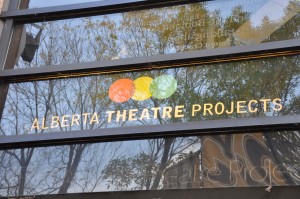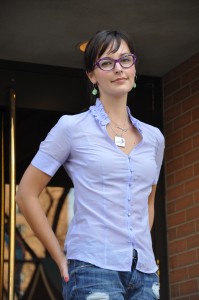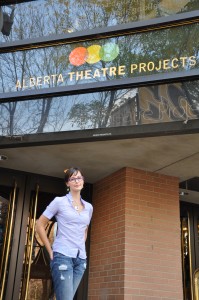
What is it like to be the daughter of a war veteran?
Playwright Linda Griffith’s narrates her personal tale of the trip she takes with her father to his last RAF bomber squad reunion. A unique one woman show narrates the war of the then and now: of one between the Allies and Nazis and one of one between a father and daughter. It’s an amazing journey of a daughter and a father and the challenges they over come in theirs wars.

Performing at the Martha Cohen’s theater for approximately month, starting on October 19, come out and watch this play!

What goes on behind the script?
What goes on behind the script and who decides if a play will even show? Amy Lynn Strilchuk, Assistant Dramaturg, is part of that process. She’s part of the artistic team at Alberta Theatre Projects that decides which shows will program, and she personally reads and recommends those scripts.
“Honest storytelling, an engaging script, engages the audience… so a play that has an active relationship to the audience.”
–Amy Lynn Strilchuk, on what makes a good script.
How the Last Dog of War was chosen to perform at the Martha Cohen Theatre
Amy had known about the script for three years. Linda Gyffintith, the author and performer of the Last Dog of War, had been previously invited to present this play at a workshop in 2007, at the same time Linda had written the Age of Arousal for the Enbridge Play Rites festival. “So we discovered that we can do it in the [Epcor Centre’s] Martha Cohen [theatre]…why not?” smiles Amy.
Past the great script
A great script doesn’t guarantee a performance in the Martha Cohen theater, however. The artistic team, in choosing their program, stand behind Vanessa Porteous, Alberta Theatre Project’s Artistic Director’s phrase: “What does it mean to be alive now?” Amy emphasized “the now,” rather than considering period pieces to understand our relations to those times.
The process of selecting plays can be very slow, as most scripts are known about for a year. These scripts under consideration of be included in the theater program is first piloted in a workshop reading. During the current Enbridge Play Writes Festival, the public are invited to these listening, to hear these scripts in progress. This gives Amy an idea of the “energy that lives between the audience and the play itself… this tells us about the sticky parts are in a play and when we’ve lost them.” For the artistic team, it’s all about the audience engagement. From those initial readings and into rehearsals, tremendous amounts of time and effort transform a play to become fully fledged, to engage a public audience.
The Finished Product
“In rehearsal, its all about getting it on its feet and activating the choices,” said Amy, “rather than getting the script down…we want to build up, not tear it down, and by that point, hopefully all the strong bones of a play are there…and we should have a clear idea of what a play is.”
How Amy got Involved
Dramaturgy was definitely a term I had heard not of until I had to interview Amy, and for her, it was an unknown possibility that had luckily presented itself to her. If you love what you’re doing, you’ll always find a job for it, as was for the case for Amy, having studied dramatic literature at the University of British Columbia. Through the Literary Mangers and Dramaturgy of America, Amy had gathered a sense of dramaturgy and their role in developing scripts, and her advice to get involved? “Go knocking on some dramaturge’s door and offer yourself for free.” Which was exactly what Amy had done, and was able to develop under a wing of a mentor, and sit in a rehearsal hall for experience.
The Challenge
Upon reading several scripts, of varying themes, characters, and lengths, providing feedback may provide to be a challenge of dramaturgy. “For me, it’s supporting the work without taking ownership of the work. By that I mean… the kinds of questions I ask are to open up possibilities for the script, rather than instruct where the play goes next. My style is like, ‘something curious is happening in scene 2. Talk to me about it. What do you want the scene to do to the audience?’ Rather than in red pen, ‘this character needs to go.’”
Dramaturgy is definitely a great “behind the scene” option for anyone interested in plays and their scripts. Thanks go to the Alberta Theatre Projects and Kids Up Front for providing tickets for upcoming performances and allowing youth to become more engaged in the arts!

